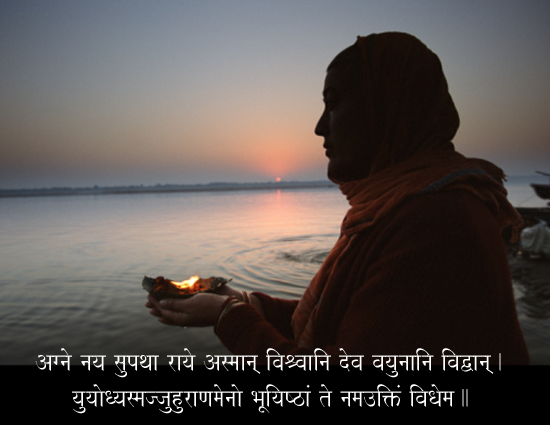Dec 23, 2025
Dec 23, 2025

Agne naya supatha raye asman
visvani deva vayunani vidvan,
yuyo-dhyas-majjuhu-rana-meno
bhuyistham te nama-uktim vidhema. (18)
O Agni!
Lead us to the wealth (Beatitude)
through a virtuous path.
Thou O God! Omniscient one!
Liberate us from the deceitful sins.
Let us offer Thee ever more
Our words of adoration.
Commentary
The last verse is a prayer of Agni. Here the Supreme has been treated as Fire God and the seeker offers prayer to the burning Fire. In the last verse of this Upanishad the seeker as in the first one, reaffirms that everything belongs to Him. This all is His wealth and it is He who pervades everywhere in the universe and nothing pervades Him. This is all the property of God. The world is like an iceberg floating on water; may be frozen or floating but it is in essence water after all. In this way all the wealth of the world belongs to Him alone as the Infinite alone is the Reality.
Gita says in X-4, “Whatever you see-beauty or glory- know that to be a bit of my glory.” The seeker wishes to enjoy that glory and remain stuck to it. For the seeker this wealth no more is a material object but as he sees God in it, he finds it something fit for his meditation and thus wants to reach a land of enlightenment and remain there. He now knows that “What God gives you, offer it to others and then partake it or else you are a thief.” (Ten Tyackten Bhunjitha)
The seeker invokes Lord Agni to grant him the Eternal Wealth. He has realized that this is Gods world. The divine is not isolated from the world. God loves those who love their fellowmen. The seeker now sees presence of divinity in all human forms and beings and all beings present in him. Like the Greek philosophers, he also understands that ‘all the world is his home and there is no saneness in those who dislike any part of creation.’
The wealth of the world apart from humanity does not exist at all. It is the unity that makes humanity. So the seeker is eager to accept as custodian what God wishes him to partake in his worldly existence. The reality of this human world depends upon our own consciousness as the one entity. We have to realise through our devotion to God in the spirit of renunciation, which is not deprivation but leaving the senses untrained is the opposite of freedom. Joy is our goal, of life. Joy and renunciation are not contradictory. They require each other and together they forge the key of Hinduism when Isha says that ‘By renouncing (the world), enjoy it.”
The seeker simply wishes to stay eternally in the spirit of devotion to the Supreme Divine (Iswar Bhava) and in the deep unremitted thought of the Supreme Spirit. He wants that no ailment or any evil spirit come in his way. He may remain pure through. word, thought and deed. He no more entertains any notion, false - identification or thought -waves.
The seeker in the sacrificial fire of Supreme Divine, while offering the oblation, utters the mantra, “Agne Idam na namah”. O Fire! I submit myself to Thee; surrender to Thee, no more I am the ego, no more I am the mind. It is the final act of a person whose ego sense has vanished away and in his state of totally dying ego who is getting himself absorbed in the Eternal Truth. He now understands that permanent Bliss is only within. All Beings thirst for Bliss but bliss in never to be found outside. It can come only from the heart. A silent mind, equipoise and balanced enters the spiritual heart of the devotee and then there manifests the Bliss. Humility and gratitude arise whenever a devotee feels Gods presence around and within him. He in full awareness becomes thankful to the Lord and this thankfulness becomes the prayer and he himself gets elevated into the spirit of the Lord.
Previous : Isha Upanishad - Shloka 17
Return to : Peace Invocation
17-Jul-2011
More by : Dr. R. K. Lahri

|
Thanks a lot for giving the explanation of the Sanskrit sloka. |